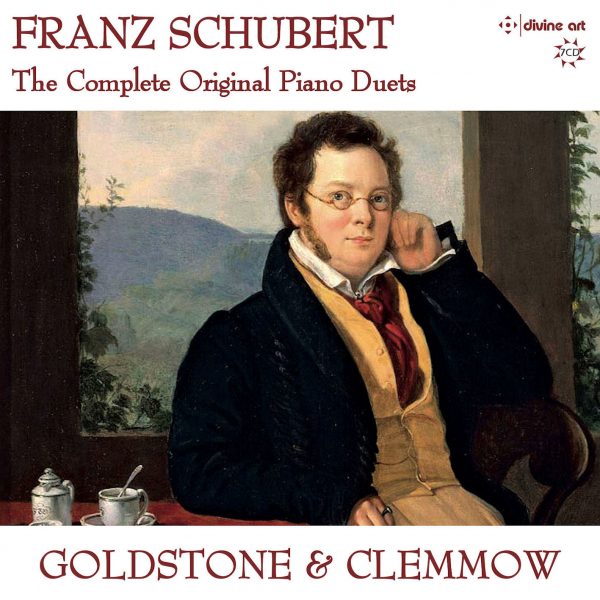Fanfare
In my review (39:2) of Goldstone and Clemmow’s previous Schubert recording, a volume of “unauthorized” four-hand transcriptions of the “Unfinished” Symphony and the “Death and the Maiden” Quartet, I praised the duo’s playing but took them to task for their choice of repertoire. “Schubert wrote a significant body of music for piano duo, including such masterworks as the Fantasy in F Minor and repertoire favorites such as the Marches Militaires,” I wrote, expressing my skepticism for the value of recording unauthorized duos in the presence of so many very fine “authorized” duos.
Schubert did indeed write a significant body of music for piano duo: over eight hours’ worth, to be precise. And Goldstone and Clemmow had already recorded all of it by the time they began examining four-hand arrangements of Schubert works. This box set was previously released by Olympia in seven individual volumes in 1999—an outgrowth of a seven-concert recital series of these works the duo presented earlier in the 1990s. The duo’s playing of the original works is every bit as impressive as that of the unauthorized work—their ensemble is flawless, even in tricky unison passages; their rubato is entirely synchronized; scale passages and filigree receive brilliant, pearly articulation; lyrical moments are played with extraordinary warmth. Best of all, they are sensitive to the color shifts inherent in Schubert’s many modulations; in their hands, sequences are never repetitive but instead develop thematic material from numerous angles, as if seen through a prism. My only criticism of the playing (and it may be more a criticism of the piano on which Goldstone and Clemmow recorded) is that the treble can occasionally be a bit thin, leaving some of the quieter melodies overshadowed by the more resonant bass.
The seven CDs in this collection follow the same programs Goldstone and Clemmow used in their live recitals. As such, each disc “presents a varied selection of major and minor works from different periods,” as the program notes indicate. This is a generally welcome approach: I’d imagine that the 58 minutes of the Six Grand Marches (D 819) would make for rather monotonous listening if played in sequence—not to mention the 41 minutes of Schumann polonaises offered as encores to each recital. To voice one of my few quibbles with the cycle, though, I find some specific instances of separation puzzling. The program notes speak of the Sixth Grand March as “a lively, optimistic climax to the set,” coming as it does after a notably somber predecessor. Even granting the likelihood that the six marches were not intended to be played as a cycle, a pairing of Nos. 5 and 6 would have been far more dramatic than the pairing of Nos. 5 and 1 presented on the second disc. Similarly, the programming divides the tiny D 618 set of four Ländler into two groups of two. Surely the three minutes or so of the complete set would not have been wearing on listeners. Most peculiarly, the first two Ländler are interspersed with the eighth of the D 783 German Dances, as if they constituted an extended minuet and trio. Elsewhere in the set, D 783 is presented in its entirety, resulting in minimal but nonetheless perplexing redundancy.
These quibbles are in no way a detraction from the achievement this cycle represents. And Schubert’s greatest four-hand works receive heartfelt, utterly masterful performances. The famous Marche Militaire in D receives a notably brisk performance, full of punchy accents and the occasional suave rubato over the transition between sections. Goldstone and Clemmow perform the F-Minor Fantasy with the profundity and confidence that only mature artists with a longstanding collaborative partnership can provide. There is a great deal of freedom to their playing of this work, yet it remains subtle and supple—a superb balance between elegance and passion. The Divertissement à la hongroise requires a more uninhibited approach, which Goldstone and Clemmow offer without ever lapsing into melodrama or straying from their characteristic precision.
Schubert is perhaps less renowned for his contribution to variation form than for his contribution to other genres, but I find his mastery of this tradition to be virtually unparalleled. I may be partial; I first fell in love with Schubert’s music as a teenager accompanying a flutist on the Tröckne Blumen Variations. Even so, I find Schubert’s four sets of four-hand variations to be among the most compelling items in this collection. Moreover, these sets offer the pianists the opportunity to exercise the full range of their interpretive and technical gifts, from the delicate filigree of the Marie Variations’ Second Variation to the tender operatic duet of D 813’s Third Variation to the Rossinian (almost Gottschalkian!) perpetual-motion finales. None of these sets of variations are programmed particularly often; they should be.
Schumann’s polonaises are very early works, inspired by Schubert but not entirely derivative. The last two or three show glimmers of Schumann’s mature harmonies. They’re trifles, but they make welcome encores.
The sound engineering is superb, providing a resonant but warm concert-hall effect. Pianissimo passages are perhaps a bit over-resonant, but the recording strikes me as a generally faithful representation of a live performance.
This is an important collection, and its rerelease as a single box set is most welcome. Highest recommendation.
@divineartrecordingsgroup
A First Inversion Company
Registered Office:
176-178 Pontefract Road, Cudworth, Barnsley S72 8BE
+44 1226 596703
Fort Worth, TX 76110
+1.682.233.4978












